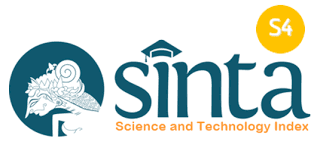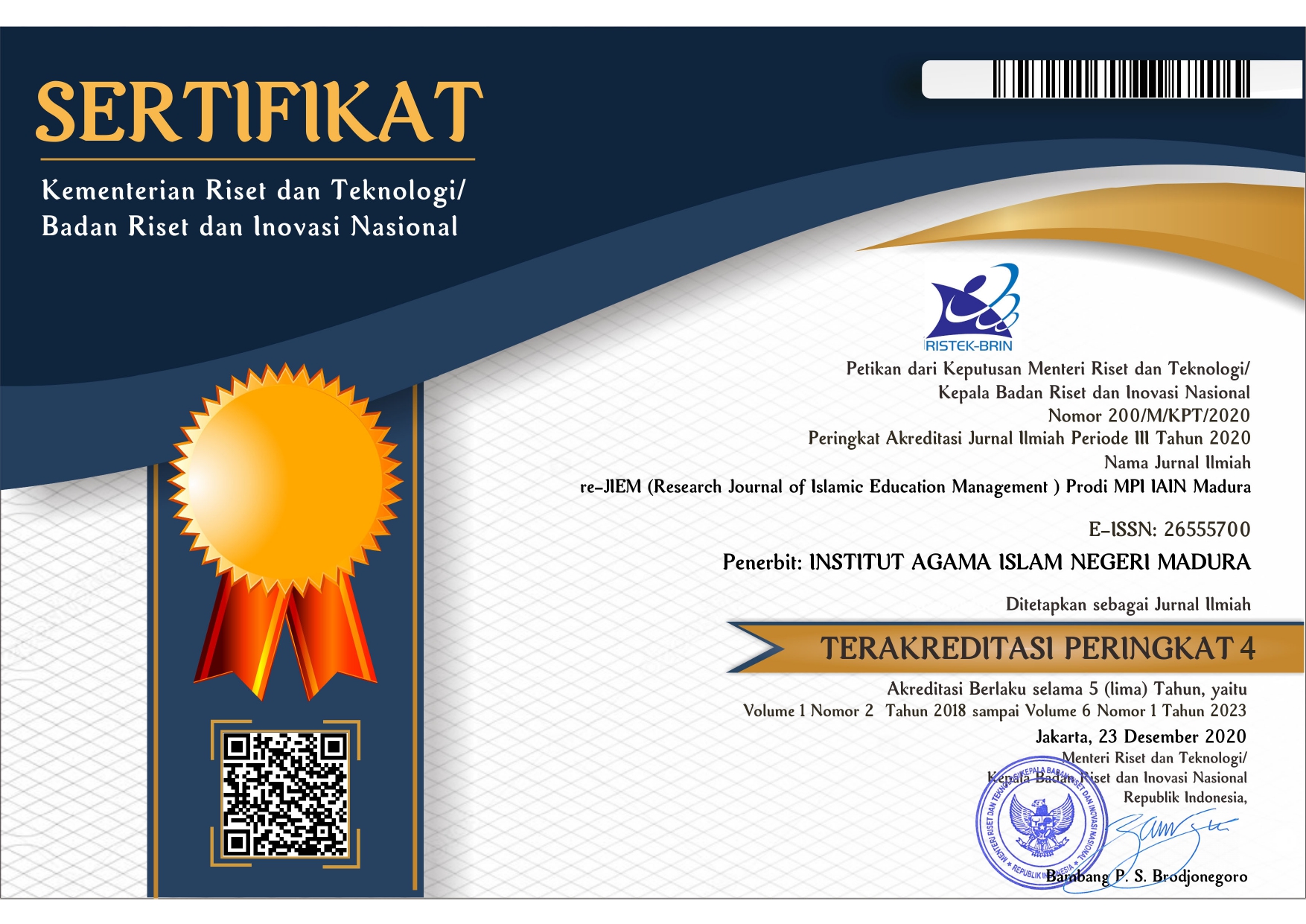KARAKTERISTIK LEADER OF CHANGE DALAM PEMBENTUKAN BUDAYA KERJA DAN PRODUKTIVITAS KERJA BERBASIS SPRITUALITY DI KUALITA PENDIDIKAN INDONESIA (KPI) SURABAYA
 Abstract views: 464
,
Abstract views: 464
,
 PDF downloads: 278
PDF downloads: 278
Abstract
This study attempts to understand the implementation of the principles of Islamic education management to make changes towards the advancement of an organization in the industrial era 4.0, that work culture and work productivity in an organization specifically in the field of educational services can be approached by growing the character of leader of change based on values spirituality. That aspects of changes in performance and work productivity can be influenced by the spiritual culture of an organization, especially in the pattern of leadership that is carried out. Also exploring leadership in this article can be seen, namely: a), how leaders create change; b) Characteristics of Leader of Changes based on spirituality; c), the Role of the Leader of Change in the formation of work culture and work productivity based on spirituality. The research method used uses a qualitative design in a descriptive way to understand deeply about leadership at KPI Surabaya, whose data is extracted through observing work dynamics and institutional performance, interviews with key informants (Executive Directors) in carrying out agency activities and efforts to document performance products KPI. Furthermore, the data obtained is processed in accordance with the theme and sub-themes obtained in the field. The research results obtained are; The way leaders create change, i.e. a) keep their employees in an uncomfortable zone, with work targets in programs that are made realistically every year so that it is measured in productivity of institutional performance, b) that the leadership character is based on the performance of the leader of the leader that partnerships. The character of leadership is more to the partnership as if there are no limits. Then personal excellence (personal excellence). Likes to explore and develop knowledge so that he at KPI is called a multy talent. as well as the most visible spiritual character of the power of honesty (integrity) and c) The Indonesian Educational Quality (KPI) Surabaya, which is forming the culture of "IMPROVE", Integrity, Mathurity, Professional, Rare, On Fire, Vastly and Ethics at Kualita Pendidikan Indonesia (KPI) Surabaya, and as a designer of the formation of productivity programs.
Downloads
References
Abdurrahman, Dudung dan Prima Mulyasari Agustini. “Hubungan Kepemimpinan Spiritual dan Spiritualitas Tempat Kerja”. Prosiding SNaPP2011: Sosial, Ekonomi, dan Humaniora, Vol 2, No.1, Tahun, 2011.
Arikunto, Suharsimi. Manajemen Penelitian. Jakarta: Rineka Cipta, 2013.
--------------------------. Prosedur Penelitian Suatu Pendekatan Praktik. Jakarta: Rineka Cipta. 2013.
Bachri, Bachtiar S. Meyakinkan Validitas Data Melalui Triangulasi Pada Penelitian Kualitatif. Jurnal Teknologi Pendidikan, Vol.10 No.1 April 2010.
Buna’i. Metodologi Penelitian Pendidikan. Pamekasan: Stain Pamekasan Press, 2006.
Bungin, Burhan. Penelitian Kualitatif. Jakarta: Kencana. 2007.
Efferin, Sujoko.Sistem Pengendalian Manajemen BerbasisSpritualitas. Jakarta: Yayasan Rumah Peneleh, 2017.
Fahmi, Irham. Pengantar Ilmu Kepemimpinan. Depok Rajawali Pers, 2018.
Gumilang, Galang Surya. Metode Penelitian Kualitatif dalam Bidang Bimbingan dan Konseling. Jurnal Fokus Konseling,Volume 2 No. 2, Agustus 2016.
Gunawan, Imam. Metode Penelitian Kualitatif. Jakarta: Bumi Aksara, 2014.
Huda, Misbahul. Dari Langit Turun Ke Bumi. Surabaya: PT. Temprina Media Grafika,2012.
Kahar, Irawati A. Konsep Kepemimpinan dalam Perubahan Organisasi. Jurnal Studi Perpustakaan dan Informasi, Vol. 4, No. 1, Juni 2008.
Kasali, Rhenald. Change Leadership. Jakarta: Mizan Anggota IKAPI, 2017.
Mansyur, Ahmad Yasser. Enhancing Work Productivity With Prophetic Leadership Model, Jurnal Intervensi Psikologi Vol. 6 No. 2 Desember 2014.
Moleong, Lexy J. Metodologi Penelitian Kualitatif. Bandung: Remaja Rosdakarya. 2014.
Nawawi, Ismail.Budaya Organisasi Kepemimpinan dan Kinerja. Depok: Kencana. 2017.
Prastowo, Andi. Metode Penelitian Kualitatif Dalam Perspektif Rancangan Penelitian. Jogjakarta: Ar-Ruzz Media. 2014.
Rafsanjani, Haqiqi.Kepemimpinan Spiritual (Spiritual Leadership). Jurnal Masharif al-Syariah: Jurnal Ekonomi dan Perbankan Syariah, Vol. 2, No. 1, 2017.
Rusdiana. Manajemen Konflik. Bandung: CV. Pustaka Setia. 2015.
Safaria, Triantoro.Kepemimpinan. Yogyakarta: Graha Ilmu. 2004.
Sedarmayanti. Tata Kerja dan Produktivitas Kerja. Bandung: CV. Mandar Maju, 2011.
Setyaningsih. Pengaruh Kepemimpinan dalam Perubahan Organisasi. Jurnal Ekonomi dan Kewirausahaan, Vol.7, No.2, Oktober 2007.
Soetopo, Hendyat. Perilaku Organisasi. Bandung: PT. Remaja Rosdakarya, 2010.
Soliha, Euis dan Hersugondo. Kepemimpinan yang Efektif dan Perubahan Organisasi. Fokus Ekonomi, Vol.7, No. 2 2008.
Sudarmanto. Kinerja dan Pengembangan Kompetensi SDM. Yogyakarta: Pustaka Pelajar 2009.
Sugandi, Lianna. Dampak Implementasi Change Management pada Organisasi. ComTech, Vol. 4, No. 1 Juni 2013.
Sugiyono. Metode Penelitian Kuantitatif, Kualitatif dan R&D. Bandung: Alfabeta, 2010.
Suprayitno. Pemimpin Visioner dalam Perubahan Organisasional. Jurnal Ekonomi dan Kewirausahaan, Vol.7, No.2, Oktober 2007.
Sutrisno, Edy.Budaya Organisasi. Jakarta: Kencana. 2010.
Thayib. Spiritual Leadership, Kepuasan Kerja dan Prestasi Kerja. al-‘Adâlah,Volume 16 Nomor 2 November 2013.
Trioctavia, Jayanti et-al. Peranan Pemimpin dalam Mengembangkan Budaya Organisasi. Jurnal Administrasi Bisnis, Vol.40, No. 01 November 2006.
Wahjono, Sentot Imam. Perilaku Organisasi. Yogyakarta: Graha Ilmu, 2010.
Wibowo.Budaya Organisasi. Depok: PT. Rajagrafinfo Persada. 2013.
Wibowo. Manajemen Perubahan. Jakarta: Rajawali Pers. 2016.
Wirawan. Kepemimpinan. Jakarta: PT. Raja Grafindo Persada, 2017.
Yogatama, Leo Agung Manggala. Kajian Spiritualitas di Tempat Kerja pada Konteks Organisasi Bisnis. Jurnal Psikologi, Vol.42, No.1, April 2015.
Zahroh, Anna Mar’atuz et-al. Kepemimpinan Perubahan Kepala Sekolah Dalam Peningkatan Mutu Pendidikan. Jurnal Administrasi dan Manajemen Pendidikan, Vol 1, No 3, September 2018.
Zalukhu, Eloy dan Andy Iskandar. I’m Leader. Jakarta: PT. Gramedia Pustaka Utama, 2017.
Authors who publish with this journal agree to the following terms:
Authors retain copyright and grant the journal right of first publication with the work simultaneously licensed under a Creative Commons Attribution-ShareAlike 4.0 International License that allows others to copy and redistribute the material in any medium or format with an acknowledgment of the work's authorship and initial publication in this journal and also allows to remix, transform, and build upon the material for any purpose, even commercially with contributions under the same license as the original.
Authors are able to enter into separate, additional contractual arrangements for the non-exclusive distribution of the journal's published version of the work (e.g., post it to an institutional repository or publish it in a book), with an acknowledgment of its initial publication in this journal.
Authors are permitted and encouraged to post their work online (e.g., in institutional repositories or on their website) prior to and during the submission process, as it can lead to productive exchanges, as well as earlier and greater citation of published work.



























